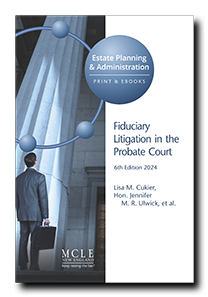Fiduciary Litigation in the Probate Court
Use the court's equity power to achieve results

- Product Number: 2070224EBK
- Publication Date: 11/24/2025
- Edition: 7th Edition 2025
- Copyright: © 2025 MCLE, Inc.
-
Add to Favorites List
Choose Format:
-
Product Description
Product Description
Use the court's equity power to achieve resultsFiduciary Litigation in the Probate Court offers essential insight and practical guidance on a wide range of issues addressed by the Massachusetts Probate and Family Court. The book covers complaints for instructions; declaratory judgments; reformation of trusts; objections to accounts; will contests; partitions; and more.
Recent updates:
-
Update: December 2025
Dear Subscriber:
Thank you for choosing to stay current in your practice with this 2025 edition of Fiduciary Litigation in the Probate Court. Inside, you will find case decisions, insights, and practice tips on topics including the following:
- Trial pacing. Chapter 1 cites a standing order requiring more efficient trial pacing in Probate and Family Court, including scheduling consecutive trial days and permitting judges to impose reasonable time limits on counsel and self-represented litigants.
- Declaratory judgment. Chapter 3 cites a 2024 case where a declaratory judgment entered by one court was deemed a final judgment with preclusive effect, notwithstanding a pending appeal.
- Present gift. Chapter 5 offers a 2024 case where the conditional gift of an engagement ring was found not to be complete, regardless of delivery and intent, when the wedding does not ensue.
- Removal of personal representative. Chapter 6 addresses a fiduciary's duty to administer the estate to give effect to the decedent's intent. The chapter includes a case vacating the removal of a personal representative and trustee who sought reformation of a trust due to drafting errors and to avoid depletion of the estate to satisfy a Medicaid lien.
- Exoneration clause. Chapter 7 addresses breach of a fiduciary's duties due to mismanagement, waste of trust property, commingling of trust funds, and self-dealing. The chapter cites a case where a judge removed a trustee and ordered compensation for losses to the trust.
- Trust accounts. Chapter 8 discusses a 2024 case in which a qualified beneficiary sought an accounting of trust assets for a period preceding the date on which their interest became qualified.
- Burden-shifting. Chapter 10 discusses a 2024 case in which the Appeals Court affirmed a decision to shift the burden of proof to the fiduciary where a fiduciary relationship existed and the fiduciary clearly benefited from the relationship.
We at MCLE trust that you will find this new content useful in your fiduciary litigation and estate planning practice, and valuable in keeping your law library current.
Cordially,
MCLE Press
-
Update: December 2025
-
Table of Contents
Table of Contents
expand allChapter 01 expandFilings in the Probate and Family Court After the MUPC and MUTC
Buy Chapter Chapter 02 expand
Chapter 02 expandComplaint for Instructions
Buy Chapter
Exhibit 2A
- Complaint for Instructions, Sample 1 Buy FormExhibit 2B
- Complaint for Instructions, Sample 2 Buy FormExhibit 2C
- Verified Complaint for Instructions Buy FormExhibit 2D
- General Probate Petition Buy FormExhibit 2E
- Decree and Order of General Probate/Trust Petition Buy FormExhibit 2F
- Affidavit of Diane Jones Buy FormChapter 03 expandDeclaratory Judgment
Buy Chapter
Exhibit 3A
- Motion to Exclude Certain Persons as Parties Buy FormExhibit 3B
- Motion to Waive the Appointment of Guardian ad Litem and Approve Virtual Representation Buy FormExhibit 3C
- Affidavit of Representative Buy FormExhibit 3D
- General Trust Petition for Appointment of Guardian ad Litem—Trust, G.L. c. 203E, § 305(b) Buy FormExhibit 3E
- Complaint for Declaratory Judgment and to Divide Trust Buy FormExhibit 3F
- Answer and Request for Declaration Buy FormExhibit 3G
- Joint Motion for Approval of Settlement Agreement Buy FormExhibit 3H
- Motion for Issuance of Decree and Order of General Trust Petition, Proposed Findings of Fact, Decree and Order Buy FormChapter 04 expandReformation of Trusts Under Massachusetts Equity Procedure
Buy Chapter
Exhibit 4A
- Complaint to Reform Trust Buy FormChapter 05 expandChapter 06 expandRemoval, Death, and Resignation of Fiduciaries
Buy Chapter Chapter 07 expand
Chapter 07 expandDefending the Trustee Against Removal
Buy Chapter Chapter 08 expandChapter 09 expand
Chapter 08 expandChapter 09 expandDefending Accounts
Buy Chapter Chapter 10 expand
Chapter 10 expandLitigating Will Contests
Buy Chapter Chapter 11 expandChapter 12 expand
Chapter 11 expandChapter 12 expandParentage
Buy Chapter
Exhibit 12A
- Petition for Approval of Voluntary Acknowledgement of Parentage Buy FormExhibit 12B
- Complaint to Rescind Acknowledgement of Parentage Buy FormExhibit 12C
- Public Assistance Affidavit Buy FormExhibit 12D
- Complaint to Establish Parentage Buy FormExhibit 12E
- Complaint for Custody, Support, and Parenting Time Pursuant to G.L. c. 209C Buy FormExhibit 12F
- Petition to Change Name of Minor Buy FormChapter 13 expandCy Pres and Deviation
Buy Chapter Chapter 14 expand
Chapter 14 expandFees in the Probate Court
Buy Chapter Chapter 15 expand
Chapter 15 expandPetition to Partition
Buy Chapter Chapter 16 expand
Chapter 16 expandAppellate Practice in Fiduciary Litigation
Buy Chapter Chapter 17 expand
Chapter 17 expandEvidentiary Privileges in Fiduciary Litigation
Buy Chapter Chapter 18 expand
Chapter 18 expandStandards of Capacity in Fiduciary Matters
Buy Chapter
- Editors & Authors

